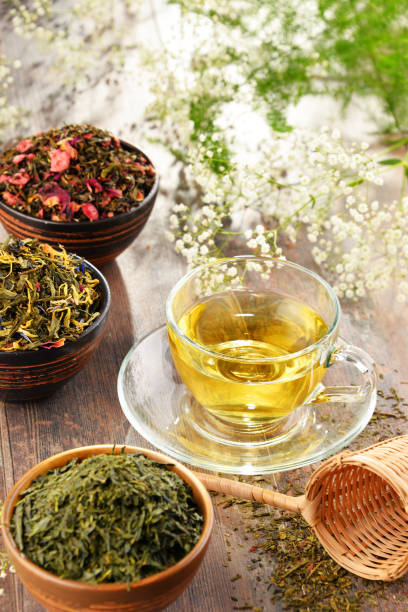Welcome to my article about “Sencha Green Tea Health Benefits”. Sencha green tea, an essential part of Japanese tea culture, is deeply cherished by tea enthusiasts around the globe due to its vibrant green color and distinctive taste. Beyond being a delicious beverage, Sencha is also a symbol of well-being and tradition. As we explore Sencha’s rich history and significant role in Japanese culture, we uncover the careful craftsmanship and traditional methods defining this exceptional tea.
Originating in Japan, Sencha green tea has been cultivated and treasured for many years. The journey of Sencha begins in sunlit tea gardens, where delicate leaves are meticulously harvested during the first harvest of the season. This early harvest results in the highest quality leaves, with a delicate balance of sweetness and astringency. Sencha’s skill involves using exact steaming and rolling methods to maintain the leaves’ inherent flavors and vivid green hue. This process, honed over generations, sets Sencha apart from other green teas and ensures a distinct taste that is both refreshing and invigorating.
In Japanese culture, the preparation and enjoyment of Sencha green tea are steeped in tradition. The brewing of Sencha is considered an art form in itself, requiring a deep understanding of water temperature and steeping times. Unlike other teas, Sencha is usually brewed at lower temperatures to maintain its delicate flavors and prevent bitterness. This meticulous attention to detail in the brewing process reflects the Japanese philosophy of finding beauty in simplicity and mindfulness in everyday practices.

What sets Sencha apart from other types of green tea is not only its unique flavor but also its cultivation and processing methods. While many green teas are pan-fired or roasted, Sencha goes through a steaming process immediately after harvesting. This steaming process prevents oxidation, preserving the tea’s natural green color and retaining its fresh, grassy notes. The outcome is a tea that is packed with antioxidants and valued for its health benefits, including boosting metabolism, enhancing mental clarity, and promoting overall well-being.
When you enjoy a cup of Sencha green tea, you are participating in a tradition that has existed for centuries. It’s more than just a beverage; it’s an opportunity to connect with the tranquil tea gardens of Japan and the meticulous work of tea masters. Embrace the ritual of Sencha, appreciate its distinct flavors, and let it transport you to a world where well-being and tradition are intertwined. If you are an experienced tea lover or a newcomer with a sense of curiosity, Sencha green tea invites you to discover its deep-rooted history and reveal the numerous advantages it provides for your well-being and way of life.
A Deep Dive into the Nutritional Profile of Sencha
Sencha green tea is highly regarded in the world of teas and is known for its rich nutritional content and cultural significance. This lively tea contains essential nutrients and bioactive compounds, which contribute to its esteemed reputation among health enthusiasts. Understanding the complex composition of Sencha reveals why it is valued not just for its refreshing flavor but also for its exceptional health-promoting properties.

At the core of Sencha’s nutritional benefits are its potent antioxidants, mainly catechins. Epigallocatechin gallate (EGCG) and other potent compounds play a vital role in preserving well-being and protecting against diseases. Catechins are recognized for their ability to counteract free radicals, thus safeguarding cells from oxidative damage. This antioxidant action is associated with numerous health advantages, including reduced inflammation, enhanced cardiovascular health, and improved metabolic function. Consequently, consuming Sencha regularly can be a delightful means of supporting overall well-being and longevity.
In addition to catechins, Sencha provides various essential nutrients, such as vitamins C and E, further enhancing its health-promoting properties. Vitamin C fortifies the immune system and assists in the production of collagen. Vitamin E promotes skin health and guards against oxidative stress. Sencha contains essential minerals like potassium, calcium, and magnesium to maintain healthy bodily functions.
One of the most intriguing aspects of Sencha is how its unique processing method preserves these valuable nutrients. Unlike many other green teas that undergo pan-firing or roasting, Sencha is immediately steamed after harvesting. This steaming process stops oxidation, preserving the tea’s natural green color and maintaining its delicate, grassy flavor. More importantly, it keeps the integrity of the bioactive compounds and nutrients. This meticulous processing ensures that Sencha retains a high concentration of catechins and other beneficial compounds, making it a potent health tonic.

Furthermore, the amino acid L-theanine in Sencha adds to its reputation as a calming beverage. L-theanine promotes relaxation without causing drowsiness, enhancing mental clarity and focus. This makes Sencha an excellent choice for individuals seeking a harmonious balance of alertness and calmness.
In conclusion, Sencha green tea’s remarkable nutritional profile and distinctive processing techniques make it an exceptional option for health-conscious individuals. Whether enjoyed as a morning pick-me-up or an afternoon refresher, Sencha provides a delicious and efficient way to nourish the body and mind. With every sip, you can take pleasure in knowing that you are indulging in a beverage that supports both wellness and tradition.
The Heart of the Matter: Cardiovascular Benefits of Sencha
Sencha green tea, widely respected in Japanese culture, has a unique position in the realm of health, particularly concerning heart health. This lively tea is more than just a calming beverage; it possesses many cardiovascular benefits supported by scientific research. Understanding Sencha’s impact on heart health begins with its abundant antioxidants and extends to its impressive effects on blood pressure and cholesterol levels.

Sencha’s cardiovascular benefits primarily stem from its high levels of catechins, potent antioxidants that play a crucial role in maintaining heart health. These antioxidants, particularly epigallocatechin gallate (EGCG), are recognized for safeguarding cells from oxidative damage, a critical factor for the development of cardiovascular diseases. By neutralizing free radicals, catechins help diminish inflammation and prevent arterial plaque accumulation, promoting smoother blood flow and healthier arteries.
An outstanding benefit of Sencha green tea is its capacity to regulate blood pressure. Drinking Sencha regularly has been proven to widen blood vessels and enhance blood circulation, lowering blood pressure. This is especially advantageous for individuals with hypertension, as managing blood pressure is vital for reducing the risk of heart attacks and strokes. Sencha’s gentle yet effective impact on blood pressure makes it a valuable component of a heart-healthy diet.
Additionally, Sencha’s antioxidant properties extend their advantages to cholesterol management. Studies suggest that the catechins in Sencha can assist in reducing LDL (bad) cholesterol levels while simultaneously increasing HDL (good) cholesterol. It is crucial to maintain this equilibrium to support a healthy lipid profile. This role is essential in preventing atherosclerosis, a condition identified by the constriction and toughening of the blood vessels. Sencha reduces the risk of coronary artery disease and other cardiovascular conditions by improving cholesterol levels.

Numerous studies have emphasized the cardiovascular benefits of Sencha green tea. For example, a study published in the Journal of Nutrition revealed that regular consumption of green tea catechins significantly decreased participants’ LDL cholesterol levels. An additional research paper released in the American Journal of Clinical Nutrition suggested that consistent intake of green tea could reduce the likelihood of developing coronary artery disease. These findings underscore the significance of incorporating Sencha into a heart-healthy lifestyle.
In summary, Sencha green tea is a delightful and natural means of promoting cardiovascular health. Its potent antioxidants, blood pressure-regulating properties, and positive impact on cholesterol levels make it a powerful asset in the pursuit of a healthy heart. As you enjoy each cup, take comfort in knowing that Sencha not only delights the senses but also benefits your heart.
Beyond the Heart: Holistic Health Advantages of Sencha Green Tea
Sencha green tea’s vibrant leaves and refreshing taste make it more than just a delightful drink. In addition to promoting heart health, it provides many advantages. It can help manage weight, relax the mind, and possibly reduce the risk of cancer. Sencha’s adaptability makes it an excellent option for enhancing overall well-being.

Sencha green tea offers the remarkable benefit of supporting weight management and boosting metabolism. Sencha is rich in catechins, particularly epigallocatechin gallate (EGCG), which have been demonstrated to increase fat oxidation and improve metabolic rates. This implies that consuming Sencha can aid in efficiently burning calories, making it beneficial for weight loss. Furthermore, combining caffeine and catechins in Sencha can stimulate thermogenesis, the body’s process of producing heat and burning fat. Therefore, regularly consuming Sencha can play a significant role in maintaining a healthy weight and enhancing metabolism.
Aside from its physical benefits, Sencha green tea also significantly impacts mental well-being. The amino acid L-theanine, abundant in Sencha, is known for its calming effects on the mind. L-theanine promotes relaxation and reduces stress without causing drowsiness. It works with caffeine to improve focus and concentration while maintaining a sense of serenity. This makes Sencha an excellent option for those aiming to enhance mental clarity and effectively manage stress. Incorporating Sencha into your daily schedule can provide a natural method for unwinding and preserving mental balance amid today’s fast-paced lifestyle.

The holistic health benefits of Sencha green tea extend to potential roles in cancer prevention and immune system support. The powerful antioxidants in Sencha, including catechins and polyphenols, have been researched for their ability to hinder the growth of cancer cells and decrease the risk of various cancers. These antioxidants shield cells from DNA damage and encourage apoptosis, the process of programmed cell death that can prevent the spread of cancerous cells. Additionally, Sencha’s vitamins and minerals, like vitamin C and selenium, enhance the body’s innate ability to resist infections and illnesses by boosting the immune system.
Integrating Sencha green tea into your lifestyle provides a comprehensive approach to health and wellness. Its benefits for weight management, mental clarity, and potential disease prevention make it a versatile and valuable addition to any diet. With every soothing sip, you’re not just enjoying a delicious beverage but also investing in your holistic health.
Integrating Sencha into Your Daily Regiment: Practical Tips and Considerations
Incorporating Sencha green tea into your everyday schedule is a simple yet meaningful step toward improving your overall well-being. This esteemed Japanese tea provides numerous advantages, but understanding how to smoothly add it to your diet, being mindful of potential side effects, and knowing how to get high-quality Sencha are all important for maximizing its benefits.

Integrating Sencha into your daily meals can be as simple as swapping your regular morning coffee for a cup of this vibrant green tea. Brewed at the correct temperature, around 160-170°F (70-80°C), Sencha offers a refreshing, slightly sweet flavor that can help kickstart your day without the jitteriness of coffee. You can also savor a cup in the afternoon for a mild energy boost and improved focus. For individuals who appreciate diversity, Sencha can be mixed into smoothies, utilized as a foundation for iced tea, or even incorporated into cooking recipes like green tea-flavored rice or desserts.
Even though most individuals usually tolerate Sencha well, knowing the possible interactions and side effects is crucial. Because of its caffeine content, consuming too much can result in problems like trouble sleeping, nervousness, and digestive issues. It’s recommended to keep consumption to 3-4 cups daily. Before adding Sencha to their daily regimen, individuals who are pregnant or nursing and those with specific medical issues should consult with a healthcare provider. Moreover, Sencha may interact with medications, particularly those affecting blood pressure and blood thinning, so it’s essential to discuss with a doctor if you’re on any prescriptions.

Finding high-quality Sencha is essential for experiencing its full benefits. When shopping, look for leaves that are a vibrant green color, indicating freshness and proper processing. Avoid Sencha with yellowish or brownish leaves, as these may be stale. High-quality Sencha will have a pleasant, grassy aroma and a uniform leaf size. Trustworthy sources for purchasing Sencha include specialty tea shops, Japanese grocery stores, and reputable online retailers. Brands that specify the origin of their tea, particularly those from renowned regions like Uji or Shizuoka, are often a good choice.
Incorporating Sencha green tea into your daily schedule improves your diet and provides a moment of mindfulness and relaxation. To fully enjoy Sencha’s delicious flavors and health advantages, be sure to choose high-quality tea, manage how much you consume, and stay mindful of any possible interactions. Drink consciously and appreciate the journey toward a more balanced and vibrant lifestyle.
Thank you for reading my article about “Sencha Green Tea Health Benefits”, and I would love to receive your comments down below, in case of any.

